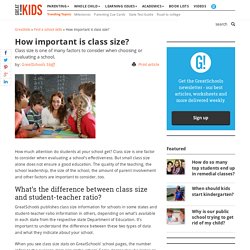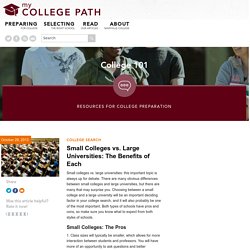

Benefits of Private Schools: Why parents choose to send kids. To teach their children the necessary skills for an ever-changing world, many parents are choosing private school education.

With options ranging from boarding schools to modern alternative curricula, there is almost certainly a school to suit each and every child. Here are the reasons why parents are choosing to give their children the unique experience of private school and why it’s worth the financial investment. Enriched academic opportunities One of the accepted benefits of private schools is that they provide exceptional and challenging educational experiences through extracurricular activities, Advanced Placement courses, and the International Baccalaureate programme, just to name a few. "The IB programme focuses on school work and on developing you as a whole person," explains Myriam Choma, a Grade 12 student at Ashbury College, "I didn’t find that in any of my other schools.
" Smaller classes Parental involvement Dedicated teachers A safe environment Community environment. How important is class size? How much attention do students at your school get?

Class size is one factor to consider when evaluating a school’s effectiveness. But small class size alone does not ensure a good education. The quality of the teaching, the school leadership, the size of the school, the amount of parent involvement and other factors are important to consider, too. What’s the difference between class size and student-teacher ratio? GreatSchools publishes class size information for schools in some states and student-teacher-ratio information in others, depending on what’s available in each state from the respective state Department of Education. When you see class size stats on GreatSchools’ school pages, the number refers to the average class size at the school. Student-teacher ratios are based on the total number of school instructional staff divided by the total enrollment of students. What defines a “small class”?
What are the benefits of small classes? Unintended consequences Teacher workload Volunteers. Why Small Classes Are Better in College. Class size and student achievement: Research review. Reducing class size to increase student achievement is an approach that has been tried, debated, and analyzed for several decades.

The premise seems logical: with fewer students to teach, teachers can coax better performance from each of them. But what does the research show? Some researchers have not found a connection between smaller classes and higher student achievement, but most of the research shows that when class size reduction programs are well-designed and implemented in the primary grades (K-3), student achievement rises as class size drops. Research findings We identified 19 studies that met our standards.
From this review of the research, we can scientifically document several important findings about reduced class size, which local school districts may find useful: The following sections describe several reduced class size programs and examine the evidence. Statewide programs Class size was verified through site visits. Implementation of programs Student-teacher ratio. Student Opinon Question. Small Colleges vs. Large Universities: The Benefits of Each. Small Colleges vs.

Large Universities: The Benefits of Each Small colleges vs. large universities: this important topic is always up for debate. There are many obvious differences between small colleges and large universities, but there are many that may surprise you. Choosing between a small college and a large university will be an important deciding factor in your college search, and it will also probably be one of the most important. Both types of schools have pros and cons, so make sure you know what to expect from both styles of schools. Small Colleges: The Pros 1. 2. 3. 4. 5. Small Colleges: The Cons 1. 2. 3. 4. 5. Large Universities: The Pros.